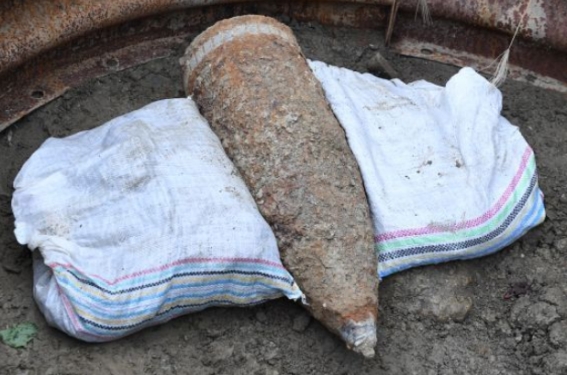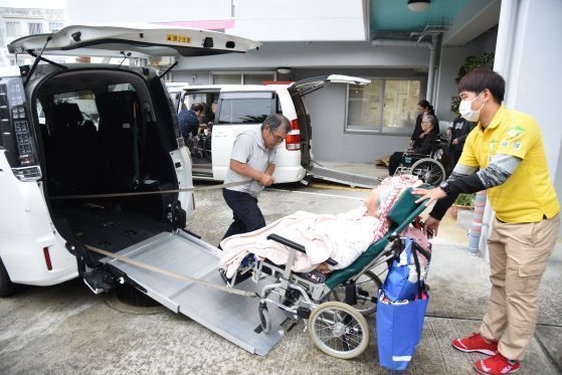Disrupting lives, the bitter legacy of war resurfaces during the disposal of undetonated ordinance in a residential neighborhood in Naha

A JSDF bomb disposal unit preparing to detonate the unexploded ordinance. December 9th Uebaru 3-cho-me, Naha City
December 10, 2018 Ryukyu Shimpo
In the Uebaru neighborhood in Naha, the sound of a large “BOOM” spread throughout a residential area as an undetonated artillery shell was disposed of by detonation December 9. The shell was found in between houses and apartments in a densely populated area. Around 2,500 people from 1,000 residences and 70 business were evacuated. The neighborhood’s residents voiced their uneasiness regarding the unexploded ordinance that was found close to people livings spaces with comments such as, “It was astonishing,” and “It feels like the war is still going on.”
Just after 8:30 a.m. a car circulated the neighborhood to hand out notices of the ordinance disposal, and Naha City employees visited homes directly to assist in the evacuation. There were people seen walking from their homes as well as those loading their families into their cars. By 10:00 a.m. the district had become a ghost town, and the roads began to close. City employees and police officers directed approaching cars to detours around the area.

The Japanese-made artillery shell found in a densely populated residential area
The two evacuation centers were the gymnasium at Oroku Junior High School and the Takara Shared Facilities Government Office. About 20 people evacuated to Oroku Junior High School.
The time was 3:03 p.m. At the moment the unexploded ordinance was detonated, a resounding “BOOM” made its way as far as Oroku. Tamiko Yonaha, 74, from Uebaru, who also heard the explosion, said, “It is inexcusable. It feels like the Battle of Okinawa is still going on.”
Joji Miyazato, 46, who lives in Oroku, lives outside the evacuation area, however the sound of the explosion reached his home, and worried, he went to the evacuation center. Many years ago a similar incident involving unexploded ordinance took place near his house. “I hope they do not find any more in the Oroku area,” he said, expressing his uneasiness.
During the evacuation period, the operation had to be called of numerous times due to people being in the evacuation area. This caused the disposal to finish about one hour later than planned, at about 5:00 p.m. A 79-year-old woman from Uebaru said, “The disposal took too long. I could not do anything during this time,” she said, visibly displeased.
The 70 businesses within the evacuation area, which included places such as a home for the elderly and a supermarket, were asked to evacuate customers and to change their operating times. At the “Ryukyu” home for the elderly, facility vehicles and elder-care taxis made countless trips starting at 7:30 a.m., including 31 residents who were confined to a wheelchair. The residents included many who lived through the Pacific War, and many expressed their feelings with comments like, “It brings back memories of the war,” and “I am unhappy that the effects of the war have lasted to the time of my children and grandchildren.”
At 7:52 a.m. Naha experienced a season-low temperature of 17.4 degrees Celsius. “Ryukyu” residents could be heard saying to employees, “Today is cold, isn’t it?” as they were being helped into vehicles, wrapped in blankets.

Residents of the nursing home “Ryukyu” in Uebaru being evacuated early in the morning of December 9 prior to the bomb disposal
One resident, an 82-year-old woman who lived through the battle of Okinawa when she was 8 years old while living in Yoza, Takamine (now known as Itoman City), lost both her mother and grandfather during the war. Shortly after her 18-year-old sister was injured and contracted tetanus, and drew her last breath while hiding in an air-raid shelter, holding a metal pipe in the mouth she could not open, trembling and repeating, “I cannot die and leave you here alone.” She stressed, “War is atrocious. It fills your heart with fear. Seventy years have passed, and still I must evacuate for an unexploded shell. Whatever else happens, was is out of the question, bases are also out of the question.”
Takeyoshi Taira ,90, another nursing home resident who fled to Oita prefecture during the war, spoke with reporters while waiting to board a vehicle the morning of December 9, and he said in a subdued voice about yet another undetonated shell being found, “The war is not yet over. It feels like we are relapsing back into war.”
(English translation T&CT and Sam Grieb)
Previous Article:Liaison committee comprising prefectural government ruling party and business world members established to demonstrate popular will against new base
Next Article:“I cannot help but feel intense indignation;” Governor Tamaki angry at land reclamation in Henoko says, nothing has changed despite petitioning the Chief Cabinet Secretary and the Minister of Defense to call it off
[Similar Articles]
- Unexploded ordnance disposal in Naha City forces 1,700 people to evacuate
- Disposal of unexploded ordnance carried out at Shuri High School
- Unexploded ordinance from World War 2 blocks Kokusai Street in Naha for one hour, 2,500 people evacuated
- Unexploded bomb diffused in Uebaru: “WWII legacy lingers”
- Disposal of unexploded ordnance at Shuri High School forces more than 2000 people to evacuate
 Webcam(Kokusai Street)
Webcam(Kokusai Street)


